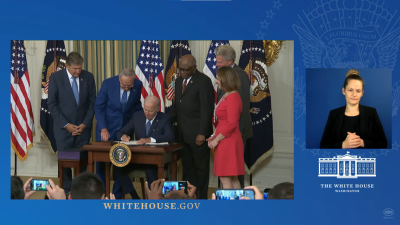 By Miriam Raftery
By Miriam Raftery
August 17, 2022 (Washington D.C.) – President Joe Biden has signed the Inflation Reduction Act, calling it “one of the most significant laws in our history.” He added, “With this law, the American people won and the special interests lost.” The bill cuts prescription drug costs for Medicare and has healthcare savings for many others, provides tax breaks and rebates for households and companies investing in clean energy, funds IRS collections from tax dodgers and levies new taxes on some corporations, also aiming to sharply reduce the federal deficit.
It includes the nation’s largest-ever investment in clean energy to attain 2/3 of the Paris Climate Change Accord goals in ten years, though in a compromise to win passage, it also includes auctioning of substantial public lands for oil and gas drilling short term, an action some environmentalists called a poison pill despite net gains in greenhouse gas reduction forecast. The bill also allows Medicare to negotiate for lower prescription drug costs and cap costs on drugs such as insulin, also extending expiring health care subsidies.
The measure is projected to reduce the deficit by $1.5 trillion this year, a step supported by 126 economists including former Treasury secretaries, fed vice chairs, and Nobel laureates.
The landmark $750 billion bill backed by Democrats passed the House and Senate without a single Republican vote. Republicans objected primarily to the bills plan to levy a 15% minimum tax on large corporations and a 1% tax on stock buybacks, as well as hiring more IRS agents to collect taxes dodged by the wealthiest 1% of taxpayers.
Here are details on what the bill includes:
Healthcare
- Insulin costs for diabetics on Medicare will be capped at $35/month.
- Total out-of-pocket prescription medicine costs will be capped at $2,000 per year for people with Medicare Part D.
- 5 to 7 million Medicare recipients will have drug costs lowered as Medicare can, for the first time, negotiate buying prescription drugs in bulk. Pharmaceutical manufacturers must pay Medicare’s proposed price, or pay a 1,900% excise tax on all sales of the drug.
- The law extends by three years a pandemic program that reduced health insurance premiums for 13 million low- and middle-income Americans, saving them around $800 a year each on health insurance premiums.
- Three million more Americans will have health insurance under the law.
- Free vaccine access will be assured for adults on Medicare and Medicaid.
Energy
- Electric vehicle tax credits of up to $7,500 for new electric vehicles and $4,000 for used electric vehicles are authorized.
- A 30% tax credit for rooftop solar can save families $9,000 over the life of a solar energy system.
- Additional consumer rebates are provided for buying energy efficient home appliances and heat pumps.
- The bill includes incentives to build a clean energy economy by2030 including ambitious goals for solar panels, wind turbines, grid-scale battery stores, and clean energy projects at rural electric cooperatives.
- It protects 2 million acres of national forests.
- It also cuts pollution by reducing greenhouse gas emissions by 1 gigaton as of 2030 – 10 times more impact than any prior climate measure enacted.
- Reducing pollution from fossil fuels is projected to prevent 3,900 premature deaths and up to 100,000 asthma attacks per year.
- Provides incentives for airlines to buy lower-carbon fuel.
- Gives incentives for industrial firms to capture and store carbon dioxide.
- Boosts federal investment and loans in emergency technologies such as hydrogen power.
- To fill short-term energy needs and gain support for the bill that passed the Senate by a one-vote margin, the bill authorizes leasing for oil and gas drilling on up to 20 million acres of land and 600 million acres of ocean – a massive area bigger than Texas and Alaska combined.
Taxes
Some large and profitable corporations have paid zero federal income taxes in recent years, including 55 of the nation’s biggest and wealthiest corporations. The top 1 percent of earners evade an estimated $160 billion in taxes annually. To address those issues and provide revenue for new programs in the bill;
- The Inflation Reduction Act will impose a 15% minimum tax on the largest and most profitable corporations.
- It is estimated to generate $124 billion over 10 years by collecting the taxes already owed by wealthy tax dodgers and large corporations, according to the Congressional Budget Office.
- A 1% excise tax on corporate stock buybacks aims to close a loophole that has allowed foreign investors and some U.S. shareholders to dodge taxes on corporate cash distributions if paid in the form of stock repurchases instead of dividends.
- Provides $80 billion to the Internal Revenue Service (IRS) to restore budget cuts under Trump. The IRS can use those funds to hire more agents to collect past-due taxes and to answer phone lines to help consumers.
- Taxes will NOT go up on any family earning less than $400,000.
- The Inflation Reduction Act is projected to save hundreds of billions of dollars each year by reducing the deficit, including a $1.5 trillion dollar reduction in the first year anticipated.
What’s not in the bill
Some provisions originally in the President’s plan were removed to get the bill passed. These included paid family leave and sick leave, universal preschool, provisions to lower college costs and extend an enhanced child credit.
While it is possible that if Republicans win control of Congress in the future, some provisions of the bill could be repealed, many of these measures are slated to take effect before 2025, when the next Presidential election winner would take office, making it less likely that popular measures such as lower prescription drug costs would be taken back.















Recent comments